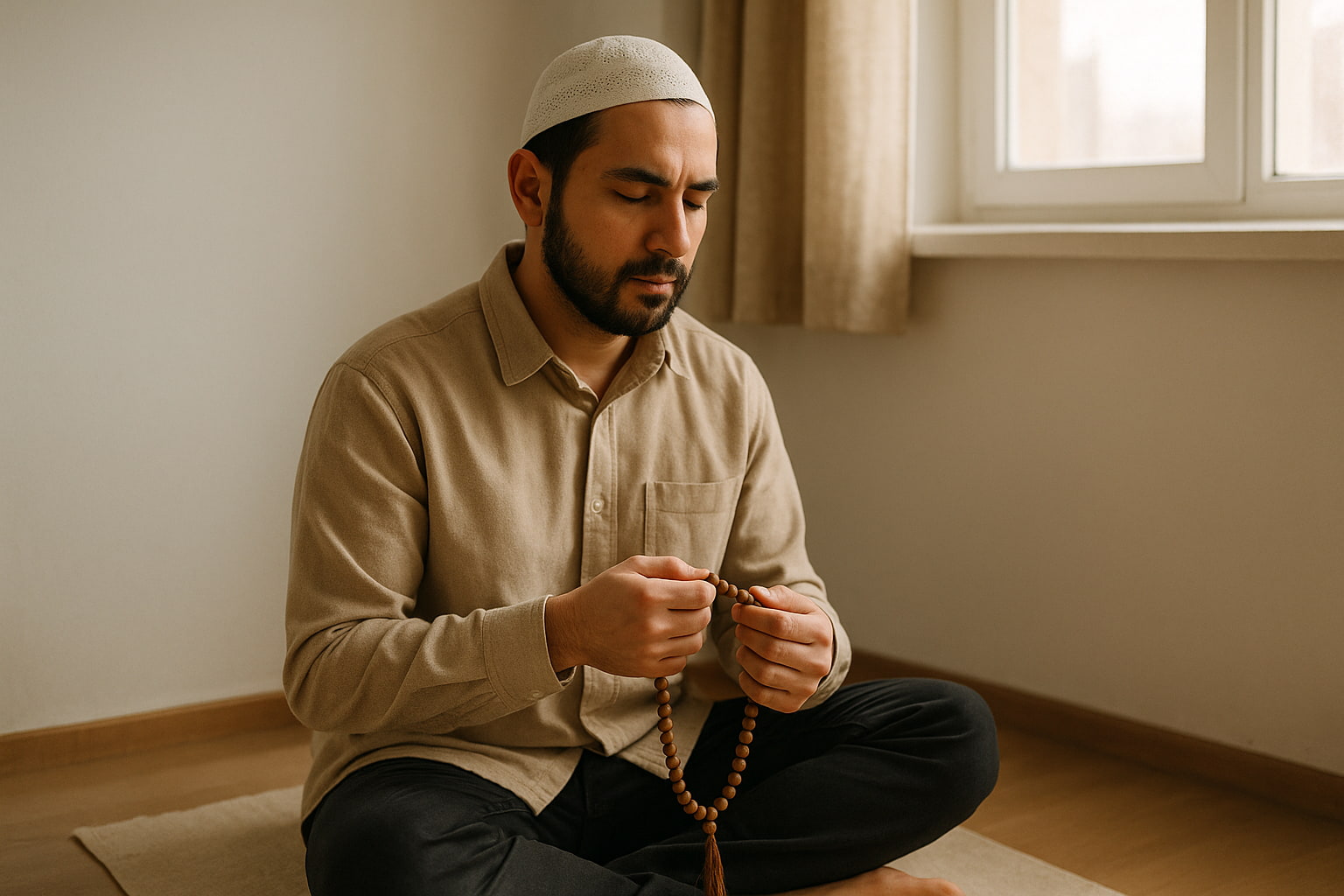Surah Al-Kahf, the 18th chapter of the Qur’an, is one of the most powerful surahs filled with profound guidance and spiritual protection. Revealed in Makkah, it contains 110 verses and four main stories that highlight core lessons every believer must learn. These stories are not just historical accounts but divine parables that reflect challenges of faith, wealth, knowledge, and power. The lessons from Surah Al-Kahf are deeply relevant to modern-day struggles and temptations.
The Youth of the Cave – Perseverance in Faith
The first story in Surah Al-Kahf narrates the tale of a group of young believers who fled their oppressive society to preserve their faith. They took shelter in a cave, and by Allah’s mercy, they were put to sleep for centuries.
Qur’anic Verse:
فَضَرَبْنَا عَلَىٰٓ ءَاذَانِهِمْ فِى ٱلْكَهْفِ سِنِينَ عَدَدًۭا
“So We cast [a cover of sleep] over their ears within the cave for a number of years.”
(Surah Al-Kahf 18:11)
These youth were determined not to compromise their beliefs, even if it meant isolation from society. The lessons from Surah Al-Kahf in this story emphasize:
- Standing firm on Tawheed (monotheism) in the face of pressure
- Seeking Allah’s help during trials
- Choosing righteous companions
Another Powerful Ayah:
إِنَّهُمْ فِتْيَةٌ ءَامَنُوا۟ بِرَبِّهِمْ وَزِدْنَـٰهُمْ هُدًۭى
“Indeed, they were youths who believed in their Lord, and We increased them in guidance.”
(Surah Al-Kahf 18:13)
The increase in guidance is a divine reward for sincerity and sacrifice.
Related Hadith:
قَالَ رَسُولُ اللَّهِ ﷺ: “الرَّجُلُ عَلَى دِينِ خَلِيلِهِ، فَلْيَنْظُرْ أَحَدُكُمْ مَنْ يُخَالِلُ”
The Prophet ﷺ said: “A man is upon the religion of his friend, so let one of you look at whom he befriends.”
(Tirmidhi)
Friendship and companionship play a critical role in maintaining or destroying faith. This lesson is beautifully illustrated in the story of the cave dwellers.
The Man with the Two Gardens – The Deception of Wealth
The second narrative in Surah Al-Kahf describes a wealthy man who became arrogant because of his vast gardens and denied the Hereafter. His companion, a poorer yet faithful man, reminded him of Allah and the transient nature of this world.
Qur’anic Verse:
وَدَخَلَ جَنَّتَهُۥ وَهُوَ ظَالِمٌۭ لِّنَفْسِهِۦ قَالَ مَآ أَظُنُّ أَن تَبِيدَ هَـٰذِهِۦٓ أَبَدًۭا
“And he entered his garden while he was unjust to himself. He said, ‘I do not think that this will ever perish.'”
(Surah Al-Kahf 18:35)
The arrogance of the garden owner represents those who forget the Creator because of the glitter of worldly success. One of the central lessons from Surah Al-Kahf here is that wealth is a test, not a guarantee of divine favor.
The Reminder from His Friend:
إِن تُرِنِ أَنَا۠ أَقَلَّ مِنكَ مَالًۭا وَوَلَدًۭا * فَعَسَىٰ رَبِّىٓ أَن يُؤْتِيَنِ خَيْرًۭا مِّن جَنَّتِكَ
“If you see me less than you in wealth and children, it may be that my Lord will give me something better than your garden.”
(Surah Al-Kahf 18:39-40)
This shows the true believer’s contentment and reliance on Allah.
Supporting Hadith:
قَالَ رَسُولُ اللَّهِ ﷺ: “لَيْسَ الْغِنَىٰ عَنْ كَثْرَةِ الْعَرَضِ، وَلَـٰكِنَّ الْغِنَىٰ غِنَى ٱلنَّفْسِ”
The Prophet ﷺ said: “Wealth is not in having many possessions, but true wealth is the richness of the soul.”
(Bukhari and Muslim)
The contrast between the two men in this story directly reflects this hadith’s wisdom.
Musa and Al-Khidr – Humility in the Pursuit of Knowledge
The third story features Prophet Musa (AS) traveling to seek knowledge from a servant of Allah known as Al-Khidr. Through their journey, Musa (AS) learns that divine wisdom is not always immediately understandable.
Qur’anic Verse:
قَالَ إِنَّكَ لَن تَسْتَطِيعَ مَعِىَ صَبْرًۭا * وَكَيْفَ تَصْبِرُ عَلَىٰ مَا لَمْ تُحِطْ بِهِۦ خُبْرًۭا
“[Al-Khidr] said, ‘Indeed, with me you will never be able to have patience. And how can you have patience for what you do not encompass in knowledge?'”
(Surah Al-Kahf 18:67–68)
The lessons from Surah Al-Kahf in this story revolve around patience, submission to divine wisdom, and humility in learning.
Each of Al-Khidr’s actions—damaging a boat, killing a boy, and repairing a wall—seemed wrong at first, but later revealed divine reasons. This teaches:
- Human knowledge is limited
- Allah’s wisdom is perfect, even when unclear to us
- Patience is a key component of seeking truth
Hadith on Knowledge:
مَنْ سَلَكَ طَرِيقًا يَلْتَمِسُ فِيهِ عِلْمًا، سَهَّلَ اللَّهُ لَهُ بِهِ طَرِيقًا إِلَى الْجَنَّةِ
“Whoever follows a path to seek knowledge, Allah will make the path to Paradise easy for him.”
(Muslim)
The story of Musa and Al-Khidr reminds us that every seeker of knowledge must have patience and humility.
Dhul-Qarnayn – Power Must Be Just
The final story in Surah Al-Kahf is about Dhul-Qarnayn, a righteous ruler granted power by Allah. He traveled across lands and eventually built a wall to protect people from the destructive tribes of Gog and Magog (Ya’juj and Ma’juj).
Qur’anic Verse:
إِنَّا مَكَّنَّا لَهُۥ فِى ٱلْأَرْضِ وَءَاتَيْنَـٰهُ مِن كُلِّ شَىْءٍۢ سَبَبًۭا
“Indeed, We established him upon the earth, and We gave him from everything a way.”
(Surah Al-Kahf 18:84)
Unlike many rulers, Dhul-Qarnayn ruled with justice, humility, and care for the oppressed. Among the critical lessons from Surah Al-Kahf here:
- True leadership is rooted in justice
- Power is a trust from Allah, not a personal achievement
- Serving the weak and protecting society is a leader’s duty
Qur’anic Reminder:
هَـٰذَا رَحْمَةٌۭ مِّن رَّبِّى ۖ فَإِذَا جَآءَ وَعْدُ رَبِّى جَعَلَهُۥ دَكَّآءَ ۖ وَكَانَ وَعْدُ رَبِّى حَقًّۭا
“This is a mercy from my Lord. But when the promise of my Lord comes, He will level it. And the promise of my Lord is ever true.”
(Surah Al-Kahf 18:98)
Even after achieving great success, Dhul-Qarnayn gave full credit to Allah’s mercy. That is the hallmark of righteous power.
Related Hadith:
إِنَّكُمْ سَتَحْرِصُونَ عَلَى الْإِمَارَةِ، وَإِنَّهَا سَتَكُونُ نَدَامَةً يَوْمَ الْقِيَامَةِ
“You will be keen on leadership, but it will be a regret on the Day of Judgment.”
(Bukhari)
This Hadith connects deeply with the humility shown by Dhul-Qarnayn, reminding that leadership is a heavy responsibility.
Core Spiritual and Moral Lessons from Surah Al-Kahf
The four stories in Surah Al-Kahf are rich in meaning. When studied deeply, they reveal universal lessons that span time, place, and circumstance:
- Faith must be unwavering, especially in times of trial (People of the Cave)
- Wealth is a test, and it must not lead to arrogance or denial of the afterlife (The Two Gardens)
- Knowledge must be pursued with humility and patience, even when the wisdom is beyond our comprehension (Musa and Al-Khidr)
- Power must be used for justice and protection, not for oppression or fame (Dhul-Qarnayn)
These powerful lessons from Surah Al-Kahf shape a believer’s perspective, fostering reliance on Allah, inner strength, and ethical conduct.
The Protection from Dajjal: A Special Lesson from Surah Al-Kahf
Among the greatest lessons from Surah Al-Kahf is its role in protecting believers from the greatest trial—Al-Masih ad-Dajjal (the Antichrist). This trial will come near the end of time and will be filled with deception, confusion, and immense tribulation.
The Prophet Muhammad ﷺ clearly advised the Ummah to recite Surah Al-Kahf as a shield:
مَن حَفِظَ عَشْرَ آيَاتٍ مِن أَوَّلِ سُورَةِ الكَهْفِ عُصِمَ مِنَ الدَّجَّالِ
“Whoever memorizes ten verses from the beginning of Surah Al-Kahf will be protected from the Dajjal.”
(Muslim)
These verses are not only protective due to their words, but because they plant the core values that combat Dajjal’s temptations:
- The trial of faith – confronted in the story of the youths in the cave
- The trial of wealth – addressed in the story of the rich man and the two gardens
- The trial of knowledge – revealed in the interaction between Musa and Al-Khidr
- The trial of power – explored through the story of Dhul-Qarnayn
By absorbing these lessons from Surah Al-Kahf, the heart is spiritually armed to recognize falsehood, resist deceit, and stay grounded in divine truth.
Light Between Two Fridays
Surah Al-Kahf holds a unique place in the weekly spiritual routine of Muslims. The Prophet ﷺ taught that reciting this Surah every Friday brings a special Noor (light) into a person’s life.
مَن قَرَأَ سُورَةَ الكَهْفِ فِي يَوْمِ الجُمُعَةِ، أَضَاءَ لَهُ مِنَ النُّورِ مَا بَيْنَ الجُمُعَتَيْنِ
“Whoever reads Surah Al-Kahf on the day of Jumu’ah will have a light shine for him between the two Fridays.”
(Hakim and Bayhaqi)
This divine light is symbolic of clarity, faith, spiritual direction, and protection from darkness in both spiritual and worldly matters. It ties directly to the Surah’s overall theme of light in trials.
Reading Surah Al-Kahf weekly allows Muslims to constantly refresh the lessons from Surah Al-Kahf in their hearts. It realigns the soul toward Allah, re-establishes the value of patience, and keeps one mindful of the Hereafter.
Relevance of Surah Al-Kahf in the Modern World
In an age dominated by materialism, constant distractions, and ideological confusion, the lessons from Surah Al-Kahf offer unmatched clarity and grounding for Muslims worldwide.
In a world of peer pressure:
The youth of the cave model how to stay strong in one’s faith, even when society turns against it.
In a culture obsessed with wealth:
The story of the two gardens warns against arrogance and reminds us of the fleeting nature of dunya.
In the age of information:
The story of Musa and Al-Khidr shows that even with vast knowledge, humans must remain humble before divine wisdom.
In times of political power and corruption:
The story of Dhul-Qarnayn demonstrates how leadership should be exercised for justice, service, and the betterment of society—not self-glorification.
These stories act as timeless blueprints for spiritual survival. The Surah does not just provide answers—it offers moral frameworks through which every Muslim can view their life and choices.
Structure and Literary Beauty of Surah Al-Kahf
Another hidden layer within the lessons from Surah Al-Kahf is the divine symmetry in its structure. Scholars have noted that the four main stories parallel four kinds of fitan (trials):
- Fitnah of Religion (People of the Cave) → requires sincerity and strong faith
- Fitnah of Wealth (Owner of the Gardens) → requires gratitude and trust in Allah
- Fitnah of Knowledge (Musa and Al-Khidr) → requires humility and patience
- Fitnah of Power (Dhul-Qarnayn) → requires justice and wisdom
This perfectly balanced structure allows each believer to assess their own trials and seek solutions through reflection on these narratives. It’s not just a Surah of guidance—it’s a divine manual for spiritual resilience.
Memorization and Daily Reflection
While Surah Al-Kahf is strongly recommended for recitation on Fridays, memorizing parts of it—especially the first and last ten verses—is another form of consistent protection. These verses contain both spiritual armor and cognitive reminders of belief, accountability, and divine reality.
وَقُلِ ٱلْحَقُّ مِن رَّبِّكُمْ ۖ فَمَن شَآءَ فَلْيُؤْمِن و۟مَن شَآءَ فَلْيَكْفُرْ ۚ
“And say, ‘The truth is from your Lord, so whoever wills—let him believe; and whoever wills—let him disbelieve.'”
(Surah Al-Kahf 18:29)
This verse encapsulates the essence of moral responsibility. Allah has laid out the truth. The choice to follow it lies with each individual. That is among the deepest lessons from Surah Al-Kahf: Allah has shown us the light; it is upon us to walk in it or turn away.
Emotional and Spiritual Comfort from the Surah
Surah Al-Kahf is not merely a text for intellectual engagement. Its words bring comfort to hearts burdened with worldly concerns. When read with reflection, it brings:
- Relief to those tested in their faith
- Perspective to those chasing wealth
- Patience to those seeking understanding
- Discipline to those entrusted with leadership
The Surah’s verses touch upon universal emotions—fear, hope, confusion, wonder, and awe. It speaks to both the intellect and the soul, grounding believers in divine wisdom while preparing them for future trials.
Final Reflection on the Core Lessons from Surah Al-Kahf
The richness of lessons from Surah Al-Kahf cannot be overstated. Every passage offers spiritual, moral, and practical insight. The Surah protects the soul, purifies the heart, sharpens the intellect, and guides the believer through every kind of test.
To truly benefit from this Surah, one must:
- Read it regularly, especially on Fridays
- Reflect deeply on each story and its symbolism
- Memorize and internalize key verses
- Implement its teachings in daily life
- Teach it to others and raise awareness of its timeless relevance
Surah Al-Kahf is more than a chapter. It is a divine light, a spiritual mirror, and a sacred shelter for every believer seeking to stay firm in the darkness of trials.
Understood! Here is the revised “People Also Ask” section with clean numbering (no “Q” or emojis), each answer written professionally and SEO-optimized using your keyword lessons from Surah Al-Kahf. Character counts for each answer are also included.
People Also Ask
1. What does Surah Kahf teach us?
The lessons from Surah Al-Kahf teach us how to respond to the trials of faith, wealth, knowledge, and power. Through real-life parables, it guides believers to stay firm in belief, humble in learning, grateful with wealth, and just in authority.
2. What is the message in Surah Kahf?
The message in Surah Al-Kahf is that life is full of spiritual and worldly trials, and only those who hold firmly to divine guidance will succeed. The lessons from Surah Al-Kahf emphasize trusting Allah, staying patient, and maintaining righteousness amidst challenges.
3. What are the 4 themes of Surah Kahf?
The four themes are:
- Trial of faith (People of the Cave)
- Trial of wealth (Man with two gardens)
- Trial of knowledge (Musa and Al-Khidr)
- Trial of power (Dhul-Qarnayn)
These themes present universal lessons from Surah Al-Kahf that help believers stay balanced in their spiritual journey.
4. What does Surah Kahf teach about worldly life?
Surah Al-Kahf teaches that worldly life is temporary and deceptive. The lessons from Surah Al-Kahf remind us that wealth and power are tests, and true success lies in sincerity, patience, and remembrance of the Hereafter.
5. What did the Prophet say about Surah Kahf?
The Prophet Muhammad ﷺ said that whoever recites Surah Al-Kahf on Fridays will have light between the two Fridays. He also said that memorizing its first or last ten verses protects against the trial of Dajjal. These hadiths reflect the deep protective lessons from Surah Al-Kahf.









